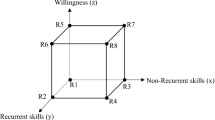Abstract
The aim of this article is to obtain specific and general learning lessons pertaining to Soft Systems Methodology (SSM) and related human activities. Some of these activities, which are of particular concern in this paper, occur within a problem-solving system (PSS), i.e., when an analyst playing the role of problem solver tackles a problem-situation (P-S)-here known as the problem-content system (PCS). It is postulated that on many occasions, depending on the way the P-S is faced, the PSS may become another PCS depending on the behavior of the solvers when facing that P-S. Such behavior is subject not only to intellectuality but also to ethics and beliefs. Initially I draw up distinctions between a PSS and a PCS and, at once, define several important terms used in SSM. An overview of three case studies carried out in Peru is presented next. Some specific and general learning lessons obtained from the analysis are then presented. Although the studies relate to concepts of SSM, the conclusions that emerge are equally applicable to many P-S's and problem-solving approaches.
Similar content being viewed by others
References
Bertalanffy, L. V. (1976).Teoria General de Sistemas, Fondo de Cultura Economica, Mexico.
Checkland, P. B. (1981).Systems Thinking, Systems Practice, John Wiley and Sons, Chichester.
Checkland, P. B. (1983). Jenkins' “reflections on management science”: tribute and comment.J. Appl. Syst. Anal. 10, 41–45.
Checkland, P. B., and Davies, L. (1986). The use of the term “Weltanschauung” in soft systems methodology.J. Appl. Syst. Anal. 13, 109–115.
Flood, R. L., and Carson, E. R. (1988).Dealing with Complexity: An Introduction to the Theory and Application of Systems Science, Plenum, New York.
Jackson, M. C., and Keys, P. (eds.) (1985).Systems Thinking in Action, Pergamon Press, Oxford.
Jenkins, G. (1983). Reflections on management science.J. Appl. Syst. Anal. 10, 15–40.
Morey, R. (1987).Experto cuestiona las obras que se hacen en la Av Brazil (newspaper interview), Diario “El Comercio”, Lima, Peru, Nov. 9.
Rodriguez-Ulloa, R. (1984). Estamos tomando decisiones adecuadas? Revista Proyeccion, AGESAN, Peru, July.
Silverman, B. G. (1985). Expert intuition and ill-structured problem solving.IEEE Trans. Engineer. Manage. EM-32(1), 29–33.
Tomlinson, R. (ed.) (1984).Rethinking the Process of Operational Research and Systems Analysis, Pergamon Press, Oxford.
Tranfield, D. (1983). Management information systems: An exploration of core philosophies.J. Appl. Syst. Anal. 10, 83–89.
Wild, R. (1977).Concepts for Operations Management, John Wiley and Sons, Chichester.
Wilson, B. (1984).Systems: Concepts, Methodologies and Applications, John Wiley and Sons, Chichester.
Author information
Authors and Affiliations
Rights and permissions
About this article
Cite this article
Rodriguez-Ulloa, R.A. The problem-solving system: Another problem-content system. Systems Practice 1, 243–257 (1988). https://doi.org/10.1007/BF01062923
Received:
Revised:
Issue Date:
DOI: https://doi.org/10.1007/BF01062923




